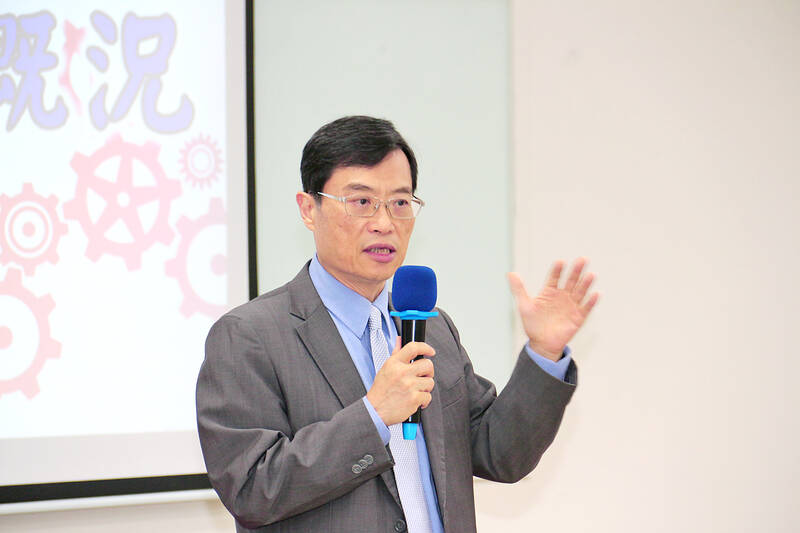Artificial intelligence (AI) medical products could become one of Taiwan’s main exports to Southeast Asia, Deputy Minister of Economic Affairs Chen Chern-chyi (陳正祺) said on Thursday.
ASEAN is the best gateway for Taiwanese firms to expand overseas, as they have already made investments in industries in the region, Chen told a forum in Taipei.
While China still produces one-third of the world’s manufactured goods, it has lost its shine due to trade disputes with the US, resulting in major changes to supply chains, he said.

Photo: CNA
The government has been helping Taiwanese businesses diversify their investments and markets by pushing the New Southbound Policy, he said.
The policy aims to enhance trade and exchanges between Taiwan and 18 countries in Southeast and South Asia, as well as Australia and New Zealand, to reduce Taiwan’s dependence on China. It was introduced after former president Tsai Ing-wen (蔡英文) took office in 2016.
Global investment in ASEAN grew 11.5 percent from 2016 to 2022, and the region’s share of global trade increased in the same period to 7.7 percent from 6.9 percent, showing its growing importance to the global economy, Chen said, citing UN data.
As part of the new administration’s plans to help businesses expand overseas, the government is expected to support Taiwanese businesses that invest in Southeast Asia, he said.
Taiwanese enterprises have a wide range of investments in the region, from investments in industries such as textiles, information and communications technology, semiconductors, electric motorcycles, smart cities, biomedicine and healthcare, Chen said.
The vision is to integrate Taiwan’s medical expertise with AI technologies and work with ASEAN in digital healthcare while exploring the region as a potential market for Taiwan’s medical and health products and services, he added.

A preclearance service to facilitate entry for people traveling to select airports in Japan would be available from Thursday next week to Feb. 25 at Taiwan Taoyuan International Airport, Taoyuan International Airport Corp (TIAC) said on Tuesday. The service was first made available to Taiwanese travelers throughout the winter vacation of 2024 and during the Lunar New Year holiday. In addition to flights to the Japanese cities of Hakodate, Asahikawa, Akita, Sendai, Niigata, Okayama, Takamatsu, Kumamoto and Kagoshima, the service would be available to travelers to Kobe and Oita. The service can be accessed by passengers of 15 flight routes operated by

GIVE AND TAKE: Blood demand continues to rise each year, while fewer young donors are available due to the nation’s falling birthrate, a doctor said Blood donors can redeem points earned from donations to obtain limited edition Formosan black bear travel mugs, the Kaohsiung Blood Center said yesterday, as it announced a goal of stocking 20,000 units of blood prior to the Lunar New Year. The last month of the lunar year is National Blood Donation Month, when local centers seek to stockpile blood for use during the Lunar New Year holiday. The blood demand in southern Taiwan — including Tainan and Kaohsiung, as well as Chiayi, Pingtung, Penghu and Taitung counties — is about 2,000 units per day, the center said. The donation campaign aims to boost

ENHANCING EFFICIENCY: The apron can accommodate 16 airplanes overnight at Taoyuan airport while work on the third runway continues, the transport minister said A new temporary overnight parking apron at Taiwan Taoyuan International Airport is to start operating on Friday next week to boost operational efficiency while the third runway is being constructed, the Ministry of Transportation and Communications said yesterday. The apron — one of the crucial projects in the construction of the third runway — can accommodate 16 aircraft overnight at the nation’s largest international airport, Minister of Transportation and Communications Chen Shih-kai (陳世凱) told reporters while inspecting the new facility yesterday morning. Aside from providing the airport operator with greater flexibility in aircraft parking during the third runway construction,

American climber Alex Honnold is to attempt a free climb of Taipei 101 today at 9am, with traffic closures around the skyscraper. To accommodate the climb attempt and filming, the Taipei Department of Transportation said traffic controls would be enforced around the Taipei 101 area. If weather conditions delay the climb, the restrictions would be pushed back to tomorrow. Traffic controls would be in place today from 7am to 11am around the Taipei 101 area, the department said. Songzhi Road would be fully closed in both directions between Songlian Road and Xinyi Road Sec 5, it said, adding that bidirectional traffic controls would